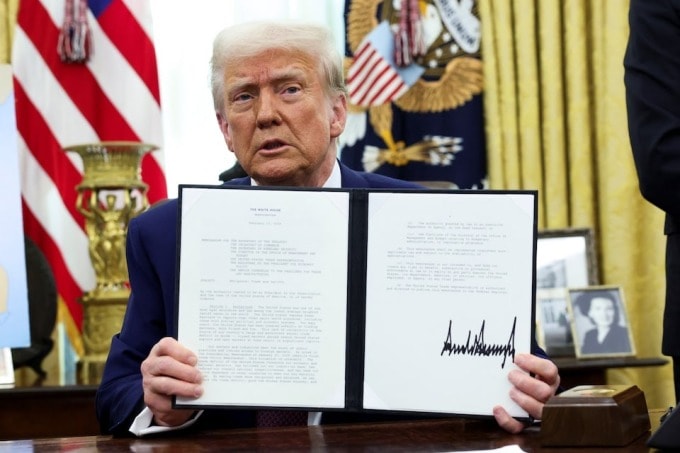US President Donald Trump has just signed an executive order imposing reciprocal import tariffs on other countries.

"We want a level playing field. The reciprocal import tax system will bring fairness," he said at a press conference ahead of a meeting with Indian Prime Minister Narendra Modi. Accordingly, the US will impose import taxes on goods from other countries equivalent to the level it currently imposes on US goods.
The US President suggested that countries reduce import taxes or eliminate them altogether. Countries that apply value-added tax (VAT) systems are also considered to impose import taxes, and shipping goods to third countries to avoid taxes is not acceptable. He cited the EU's application of VAT of up to 20%, which has caused many US businesses, such as Apple, to suffer.
White House officials said the reciprocal import tariffs also aim to address non-tariff barriers, such as VAT, government subsidies and exchange rate policies that impede the flow of US goods abroad.
The Commerce Department and the US Trade Representative will then submit a detailed report on how to proceed with each country that has foreign trade relations with the US. Howard Lutnick, Trump's nominee for US Commerce Secretary, confirmed that the study will be completed by April 1. They will first consider cases with the largest trade surpluses and apply the highest import tariffs to the US.
White House officials said the reciprocal tariffs would not take effect immediately and could take weeks or months to be implemented. The move is intended to give countries time to negotiate new trade terms with the United States.
Mr. Trump also announced that he will soon impose a separate import tax on cars entering the US.
The plan to impose reciprocal import tariffs was announced by Mr. Trump last weekend. At the time, Mr. Trump asserted that this would help the US "get treated fairly like other countries." The US president has long complained about the European Union (EU) imposing a 10% tax on imported cars. Meanwhile, the rate in the US is only 2.5%. He often criticizes Europe for "not buying American cars" but exporting millions of them to the US every year.
In recent hearings, Lutnick has expressed concern about India’s high import tariffs, while Jamieson Greer, Trump’s nominee for U.S. Trade Representative, has complained about Brazil’s import tariffs and trade barriers.
Source ofReuterssaid structuring this type of tax is a challenge for Trump administration officials. Because they will have to review the taxes that currently apply to thousands of products from nearly 190 countries. That is why Mr. Trump cannot announce the reciprocal import tax at the beginning of the week as previously announced.
Global trade tensions have escalated in recent weeks, with US President Donald Trump signing an executive order on February 1 imposing a 25% tariff on goods from Canada and Mexico and a 10% tariff on goods from China. However, on February 3, he announced a delay in imposing import tariffs on Mexico and Canada, after reaching an agreement to crack down on smuggling and immigration with the two countries.
US import tariffs on China remain in effect since February 4. China immediately retaliated with tariffs of 10-15%. It also launched an antitrust investigation into Google, tightened export controls on a range of key metals and blacklisted two US companies.
Earlier this week, Mr. Trump also announced a 25% tariff on all aluminum and steel imported into the US.
LA (synthesis)